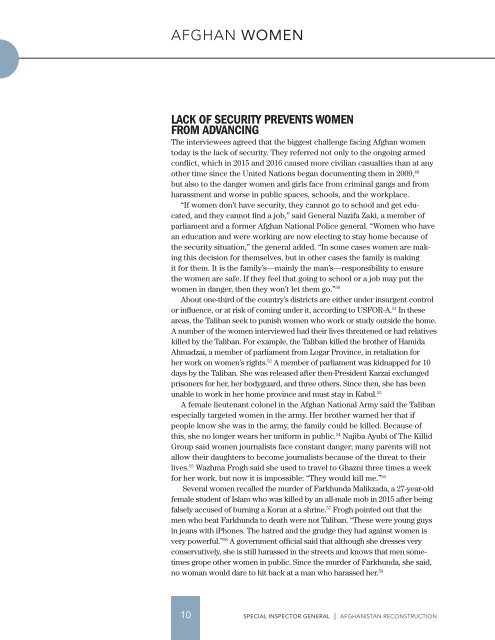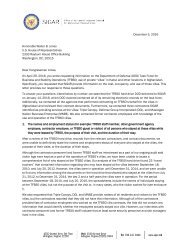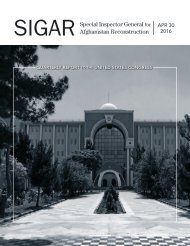SIGAR
2016-10-30qr
2016-10-30qr
Create successful ePaper yourself
Turn your PDF publications into a flip-book with our unique Google optimized e-Paper software.
AFGHAN WOMEN<br />
LACK OF SECURITY PREVENTS WOMEN<br />
FROM ADVANCING<br />
The interviewees agreed that the biggest challenge facing Afghan women<br />
today is the lack of security. They referred not only to the ongoing armed<br />
conflict, which in 2015 and 2016 caused more civilian casualties than at any<br />
other time since the United Nations began documenting them in 2009, 49<br />
but also to the danger women and girls face from criminal gangs and from<br />
harassment and worse in public spaces, schools, and the workplace.<br />
“If women don’t have security, they cannot go to school and get educated,<br />
and they cannot find a job,” said General Nazifa Zaki, a member of<br />
parliament and a former Afghan National Police general. “Women who have<br />
an education and were working are now electing to stay home because of<br />
the security situation,” the general added. “In some cases women are making<br />
this decision for themselves, but in other cases the family is making<br />
it for them. It is the family’s—mainly the man’s—responsibility to ensure<br />
the women are safe. If they feel that going to school or a job may put the<br />
women in danger, then they won’t let them go.” 50<br />
About one-third of the country’s districts are either under insurgent control<br />
or influence, or at risk of coming under it, according to USFOR-A. 51 In these<br />
areas, the Taliban seek to punish women who work or study outside the home.<br />
A number of the women interviewed had their lives threatened or had relatives<br />
killed by the Taliban. For example, the Taliban killed the brother of Hamida<br />
Ahmadzai, a member of parliament from Logar Province, in retaliation for<br />
her work on women’s rights. 52 A member of parliament was kidnapped for 10<br />
days by the Taliban. She was released after then-President Karzai exchanged<br />
prisoners for her, her bodyguard, and three others. Since then, she has been<br />
unable to work in her home province and must stay in Kabul. 53<br />
A female lieutenant colonel in the Afghan National Army said the Taliban<br />
especially targeted women in the army. Her brother warned her that if<br />
people know she was in the army, the family could be killed. Because of<br />
this, she no longer wears her uniform in public. 54 Najiba Ayubi of The Killid<br />
Group said women journalists face constant danger; many parents will not<br />
allow their daughters to become journalists because of the threat to their<br />
lives. 55 Wazhma Frogh said she used to travel to Ghazni three times a week<br />
for her work, but now it is impossible: “They would kill me.” 56<br />
Several women recalled the murder of Farkhunda Malikzada, a 27-year-old<br />
female student of Islam who was killed by an all-male mob in 2015 after being<br />
falsely accused of burning a Koran at a shrine. 57 Frogh pointed out that the<br />
men who beat Farkhunda to death were not Taliban. “These were young guys<br />
in jeans with iPhones. The hatred and the grudge they had against women is<br />
very powerful.” 58 A government official said that although she dresses very<br />
conservatively, she is still harassed in the streets and knows that men sometimes<br />
grope other women in public. Since the murder of Farkhunda, she said,<br />
no woman would dare to hit back at a man who harassed her. 59<br />
10<br />
SPECIAL INSPECTOR GENERAL I AFGHANISTAN RECONSTRUCTION




